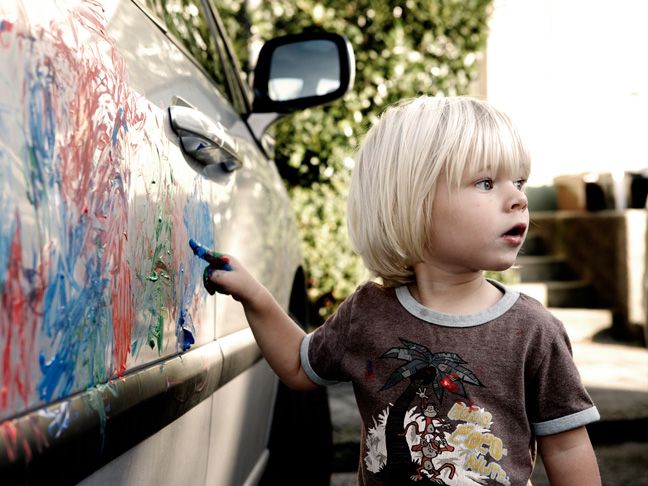So, I did as I was told. I talked to my boys about how important it was to listen to their teachers, and that if they did, they could have even more fun with them. I explained that at school, there’s time to run around and be silly, and then there’s time to sit and be quiet and be good listeners. They seemed to understand, but a couple of days later, I was told that one of my boys had been acting out again. Unsure what to do, I decided to implement a rewards chart; for every day that the boys got a good report from their teachers, they would get a sticker, and after ten stickers, they could get a toy.
Well, let me tell you, it worked! A couple of the teachers told me how well they were doing, and they even sent the boys home with notes telling me when they had “a great day.” Phew, I was so relieved! So, of course, after they got ten stickers, we went to the store and they each picked out something they wanted. They were so proud. I was so proud.
But then, just a few days later, on a Friday, the teachers told me that both boys had a hard day, running around at circle time, even throwing food. WTH?! So right there at pick-up, in front of the teachers, I told my boys how disappointed I was, and asked if I would have to take away their new toys. I was so upset, really disproportionately so. This wasn’t that big of a deal: they’re 4 years old, and this is what 4-year-olds do. I just hated feeling like either of my kids was “the problem child.” Although the teachers had all reassured me that this was all par for the course, I couldn’t help feeling embarrassed and disappointed.
That afternoon, I kept talking to my kids about it, but it felt like I was talking to a wall. They were “yes-ing” me a lot, but did they actually get it? I felt so frustrated, worried, and concerned about how they would ultimately do in kindergarten which is only, oh, 10 months away. Wait a second, we have like a whole year almost. They’re 4-years-old! Practically babies!
Then, it hit me: What was I freaking out about? They’re sweet, smart, good boys, and this is what kids this age do. Also, I realized that maybe all of this conversation was just going to become self-fulfilling. How many times can you talk to a kid about his acting out, until he starts to see himself as a kid who acts out? How many times can you tell a kid that you’re disappointed in him, until he starts to feel like a disappointment? How long until he starts to identify himself as the “problem child”?
In the midst of all of this, a friend of mine was telling me that her son had been having a hard time at his school — lots of meltdowns or shutdowns, acting up, and then wanting to be left alone. After discussing it with a couple of therapists, she realized that her very sensitive son was being labeled a “problem child.” When he got upset, they treated it like a nuclear disaster, which amplified his feelings. It also hurt his feelings. Every day, his emotional needs were being met with frustration, and his behavior only got worse. A sweet little misunderstood preschooler had been deemed a discipline problem, instead of just being recognized as a sensitive child, and was now starting to live up to the school’s negative expectations.
I didn’t want my boys to start believing that they themselves were discipline problems. I didn’t want to dialogue this whole thing to death, talking about it so much that all my kids could hear was everything they were doing wrong. They’re incredible boys and while they can definitely be wild at times, that’s not who they are. It’s not what defines them. I wanted to keep reminding them of the good: how proud I am of them and how wonderful they truly are.
So, we’ve stopped talking about how they’re doing at school. I don’t ask them every single damn day if they were good listeners. I will say that I haven’t heard any more about it from the teachers, so my guess is that they’re getting better. At the very least, we’ve all now made it a non-issue.
I’m not saying that we should just ignore our children’s bad behaviors. Not at all. I believe in boundaries and discipline. I believe that even young children should be taught how to be respectful of adults. But I don’t think you need to keep reminding kids of all of the things they’re doing wrong. I don’t think you need to keep hammering in how to behave, or railing on them for not behaving. In my experience, and according to experts, positive reinforcement is way more effective than shaming your littles. So I’ve been laying on the praise when they do something sweet, or share well, or are resourceful. And I especially lay it on when they’re being good listeners and acknowledge what I ask of them. They deserve it. They deserve to feel good about themselves, and they most definitely need to hear it from Mommy. All kids are essentially good kids, and it’s our job as parents to make sure they know that.
More on Parenting:








